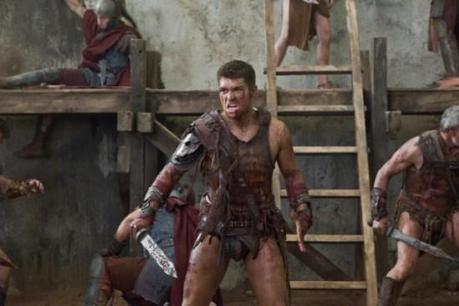Contributor: John Keegan
Written by Steven S. DeKnight
Directed by Jesse Warn
Depending on how one wishes to interpret the historical record of Spartacus’ War, this effectively wraps up the first third of the saga. Spartacus’ journey from capture to gladiator to rebel leader in the shadow of Vesuvius is well-documented. The writers clearly saw this as the perfect division point as well, because they effectively killed off any character that wasn’t known to survive into the next phase of the campaign.

All season long, I was wondering how they would adapt the whole “ropes of vine” incident to the demands of the narrative, and overall, I was pleased. Having the catapults on hand livened the battle up a bit, and it also gave a logical context for Spartacus and a handful of trusted allies to turn the tables on the Romans. Seeing as it is generally thought to be more of a flanking maneuver than anything else, this fits the history while working within the constraints of the show’s budget.
This being a major turning point, with so many characters reaching their logical endpoint, one had to know the body count would be ridiculously high. And it started early with Mira, who I thought had the most chance of surviving out of the various candidates. Her dispatch was brutal enough to remind viewers that all but perhaps three characters were expendable.
I would have much rather seen Naevia meet her end, if only because the writers’ attempt to give her a big moment in the finale was by far the worst part of the episode. It may have been one of the worst things on the show, period. Having established that Ashur, in his prime, was more than a match for many of his former brothers of the sands, it makes no sense for Naevia to best him in single combat. Especially when they spent an inordinate amount of time showing that she had no skill whatsoever with a blade. (Apparently the new actress can add fight choreography along with acting on the list things she can’t do.) Ashur had to die, but not like that.
Oenomeus, of course, was known to have fallen early in the rebellion, with no mention of him in the historical record after the battle at Vesuvius. As such, his death was all but assured. Having him die alongside Gannicus, however, was a brilliant way to pay off the character arc for both men to this point. As much as I’ll miss Mira and Ashur for what they brought to the table, Oenomeus will be the greater loss by far. (I suspect there will be many repeat viewings of earlier seasons in future.)
On the Roman side, one cannot ignore the wonderfully intense conclusion to the saga of Lucretia and Ilithyia. History sometimes comes down to a matter of seconds, and had Ilithyia not hesitated, she might have escaped her fate. Instead, Lucretia’s madness was fully revealed, as her plan to take Ilithyia’s child with her to the afterlife saw fulfillment. After all the scheming since the start, it seems fitting that Ilithyia would be brought down at Lucretia’s hands. The producers are going to have a tough time filling the sandals of Lucy Lawless and Viva Bianca, to say the least.
And of course, there is Glaber, Spartacus’ focus of vengeance since the very start. After the previous episode’s wildly pornographic death scene for Seppia, they took it even one step further with Glaber’s death. The imagery was dead solid perfect, and left very little to subtext. One must give enormous credit to Craig Parker, because his character arc required a great deal of subtlety, and he pulled off the transition from power-hungry to obsessed with perfection.
With so many key characters sent to the afterlife, it’s a fair question to ask what the next step might be. Spartacus and his allies must see to building an army, and they will be moving far from Capua. The historical record doesn’t have Crassus and his legions entering the fray for another year or so, after several other engagements, but it’s also true that the historical record is spotty for 72 BC; the writers could easily have those other battles led by Roman commanders under Crassus’ command.
The fact remains that Spartacus was only beginning his rise with the victory at Vesuvius, and he managed to defeat many attempts by the Romans to quell the rebellion before Crassus brought his harsh discipline and cruelty to the field. At the same time, with the histories largely vague from this point forward, I see no reason why the writers shouldn’t be capable of arranging events to maximum effect.
Writing: 2/2
Acting: 2/2
Direction: 2/2
Style: 3/4
Final Rating: 9/10
(Season 2 Final Average: 8.1)

